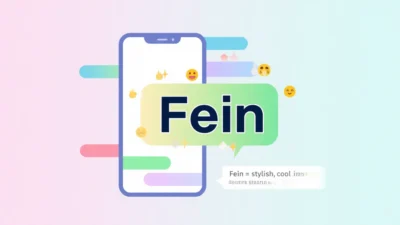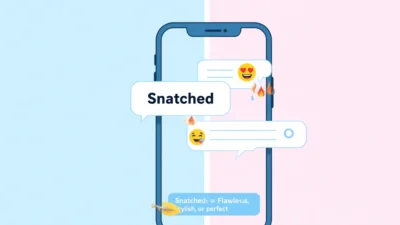If you’ve ever watched a K-drama or scrolled through K-pop Twitter, you’ve probably seen some Korean slang words pop up — and maybe you froze for a second wondering, “Wait… what does THAT mean?” I remember the first time a friend texted me “ㅋㅋㅋ” and I thought they had leaned on their keyboard.
Turns out, I had just met one of the most iconic Korean texting expressions.
Whether you’re a K-drama fan, a K-pop stan, or simply learning Korean, understanding modern Korean slang makes conversations feel way more natural, fun, and connected.
Quick Answer:
Korean slang refers to casual, playful, and internet-friendly Korean expressions used in texting, social media, and everyday chats — especially among teens and young adults. It’s NOT formal, but it’s super helpful for sounding natural and keeping up with K-culture.
🧠 What Does Korean Slang Mean in Text?
Korean slang includes shortened phrases, internet acronyms, sound-based expressions, and playful words commonly used in Korean online communities. These slang terms help people express emotions quickly, just like English slang such as “LOL” or “brb.”
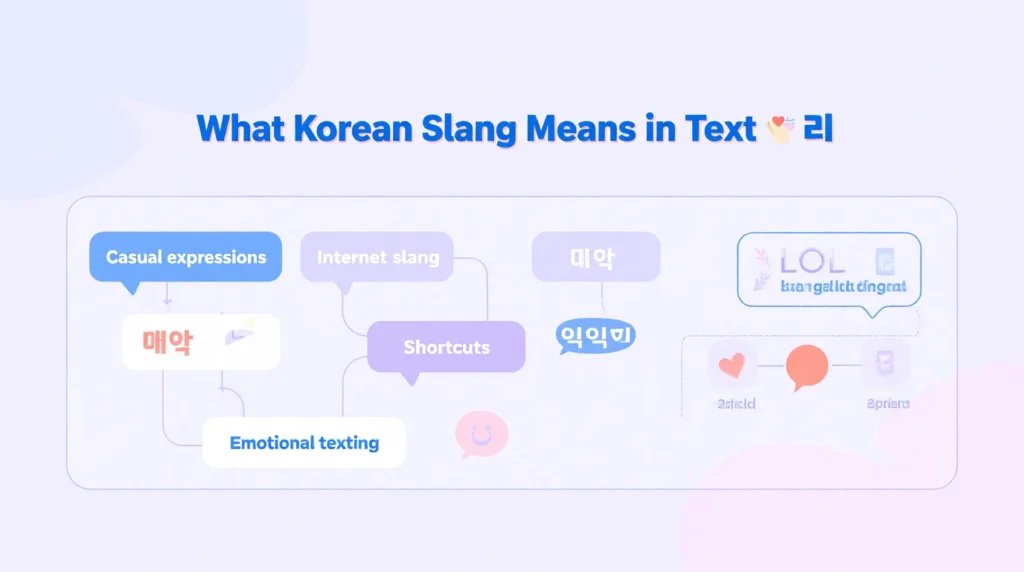
Example:
“와… 진짜 대박 😂”
Translation: “Wow… that’s amazing!” (대박 = awesome / unbelievable)
In short:
Korean Slang = Casual Korean expressions = Fun, expressive shortcuts in texting.
📱 Where Is Korean Slang Commonly Used?
You’ll see modern Korean slang almost everywhere online, especially in:
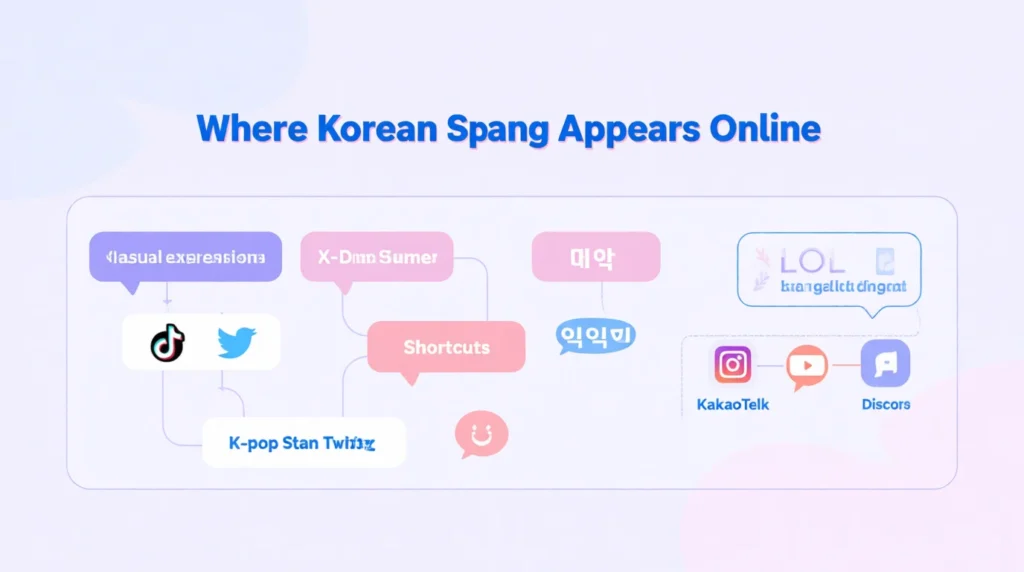
- TikTok 🇰🇷 (K-culture edits & comments)
- K-pop Twitter (X) 🫰
- Instagram and Reels
- KakaoTalk 💛 (Korea’s main messaging app)
- Discord groups
- K-drama meme pages
- YouTube comments
Tone:
- ✔️ Casual
- ✔️ Friendly
- ✔️ Informal
- ❌ Not suitable for formal communication
💬 Examples of Korean Slang in Conversation
Here are real, natural chat examples using popular slang:
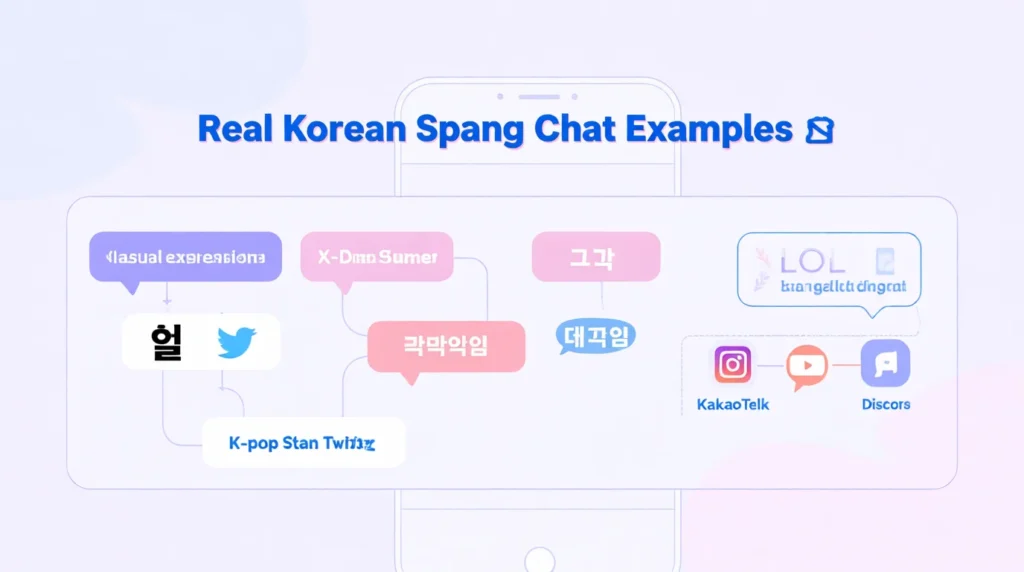
1.
A: 너 오늘 너무 예쁘다 😭
B: 헐 고마워!!
2.
A: 방금 영상 봤어?
B: ㅋㅋㅋㅋ 개웃겨 😂
3.
A: 나 시험 망함…
B: 아… 레알?
4.
A: 내일 만나도 돼?
B: ㄱㄱ ㄱㅅ!
5.
A: 새 앨범 어때??
B: 미쳤다 진짜… 대박임.
6.
A: 나 배고파 ㅠㅠ
B: 나도 ㅜㅜ 뭐 먹을까?
7.
A: 너 완전 센스 있네
B: 아냐ㅋㅋ 부끄럽다
These examples mix Korean slang, texting symbols, and emotions — the way real Korean chats look.
🕓 When to Use and When Not to Use Korean Slang
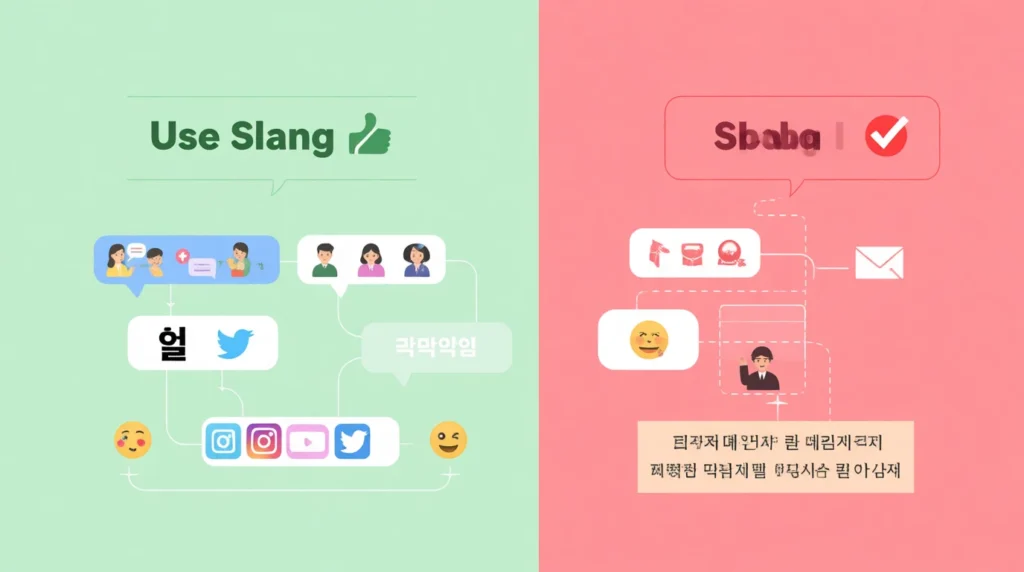
✅ Use Korean Slang when…
- Texting close friends
- Commenting on K-pop or K-drama content
- Posting on TikTok or Instagram
- Chatting in casual group chats
- You want to sound playful or relatable
❌ Avoid Korean Slang when…
- Writing emails
- Talking to teachers, elders, or coworkers
- Messaging in work or professional spaces
- Speaking in formal Korean (존댓말)
- You’re unsure of the other person’s tone preference
Comparison Table
| Context | Example Phrase | Why It Works |
|---|---|---|
| Friend Chat | “헐 대박 😂” | Shows excitement; fun & casual |
| Work Chat (Korean) | “확인 후 알려주세요.” | Polite & professional |
| “자료 검토 후 회신 부탁드립니다.” | Formal and clear | |
| Social Media | “와… 미쳤다 이 영상” | Trendy and expressive |
🔄 Similar Slang Words or Alternatives
Below are popular Korean slang alternatives, with meanings and usage tips:
| Slang | Meaning | When to Use |
|---|---|---|
| 헐 (heol) | “OMG / no way” | Surprise or disbelief |
| 대박 (daebak) | Amazing / awesome | Positive excitement |
| 레알 (real) | “For real?” | Shock or agreement |
| ㅋ/ㅋㅋ/ㅋㅋㅋ | laughter | Any casual chat |
| ㄱㄱ (go go) | Let’s go | Inviting someone to do something |
| JMT | Super delicious | Talking about food |
| 쫀맛 | Tasty / awesome | Food or vibe appreciation |
❓ FAQs About Korean Slang
1. Is Korean slang formal or polite?
No — it’s always casual and should be used with friends or online.
2. Do K-dramas use real Korean slang?
Yes! Many popular phrases spread through dramas, especially comedic ones.
3. Is slang different from internet shorthand?
Some slang is full words (대박), while others are abbreviations (ㄱㄱ).
4. Can beginners use Korean slang?
Absolutely — it’s great for sounding natural and understanding memes.
5. Do idols use Korean slang?
Yes! K-pop idols often use slang in livestreams, tweets, and fan messa
🌈 Final Thought
Learning Korean slang is one of the fastest ways to sound natural, understand jokes, and connect more deeply with K-culture.
Whether you’re texting friends, watching dramas, or decoding idol messages, these casual expressions make Korean feel alive and fun. Keep exploring, keep practicing — and soon, you won’t just recognize slang… you’ll be using it like a pro.

Hadi Bhatti is a passionate writer and content creator at Saypadia, known for turning complex words, phrases, and internet slang into simple, easy-to-understand explanations. With a strong interest in language, meanings, and digital communication, Hadi focuses on helping readers understand what words really mean in everyday use. His writing style is clear, engaging, and user-focused, making learning both practical and enjoyable.



